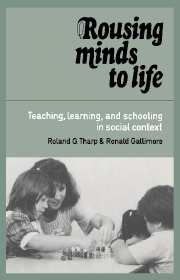Book contents
- Frontmatter
- Contents
- Acknowledgments
- Introduction
- Part I Teaching, schooling, and literacy: a unified theory of education
- 1 The redefinition of teaching and schooling
- 2 A theory of teaching as assisted performance
- 3 The means of assisting performance
- 4 The social organization of assisted performance
- 5 Language, literacy, and thought
- Part II Practice
- References
- Author index
- Subject index
2 - A theory of teaching as assisted performance
Published online by Cambridge University Press: 05 June 2012
- Frontmatter
- Contents
- Acknowledgments
- Introduction
- Part I Teaching, schooling, and literacy: a unified theory of education
- 1 The redefinition of teaching and schooling
- 2 A theory of teaching as assisted performance
- 3 The means of assisting performance
- 4 The social organization of assisted performance
- 5 Language, literacy, and thought
- Part II Practice
- References
- Author index
- Subject index
Summary
The development of cognition in society
It is ironic that the school – which alone among formal institutions has teaching as its primary goal – is notable for a lack of teaching, whereas all societies, including the most primitive, succeed in teaching the vast majority of their young members all those basic cognitive, social, and attitudinal structures that constitute cultural socialization. This teaching occurs largely without formalization, and largely without awareness.
This embarrassing comparison is often dismissed as a function of the schools' “more complex curriculum” of literacy and technology. Schools do indeed have particular constraints and unique technical demands, which we shall discuss in detail; nevertheless, schools have much to learn by examining the informal pedagogy of everyday life. The principles of good teaching are not different for school than for home and community. When true teaching is found in schools, it observes the same principles that good teaching exhibits in informal settings.
Long before they enter school, children are learning higher-order cognitive and linguistic skills. Their teaching takes place in the everyday interactions of domestic life. Within these goal-directed activities, opportunities are available for more capable members of the household to assist and regulate child performances. Through these mundane interactions, children learn the accumulated wisdom and the cognitive and communicative tools of their culture. They begin to develop functional cognitive systems; they begin to generalize their new skills to new problems and to novel aspects of familiar situations; they learn how to communicate and think.
- Type
- Chapter
- Information
- Rousing Minds to LifeTeaching, Learning, and Schooling in Social Context, pp. 27 - 43Publisher: Cambridge University PressPrint publication year: 1989



